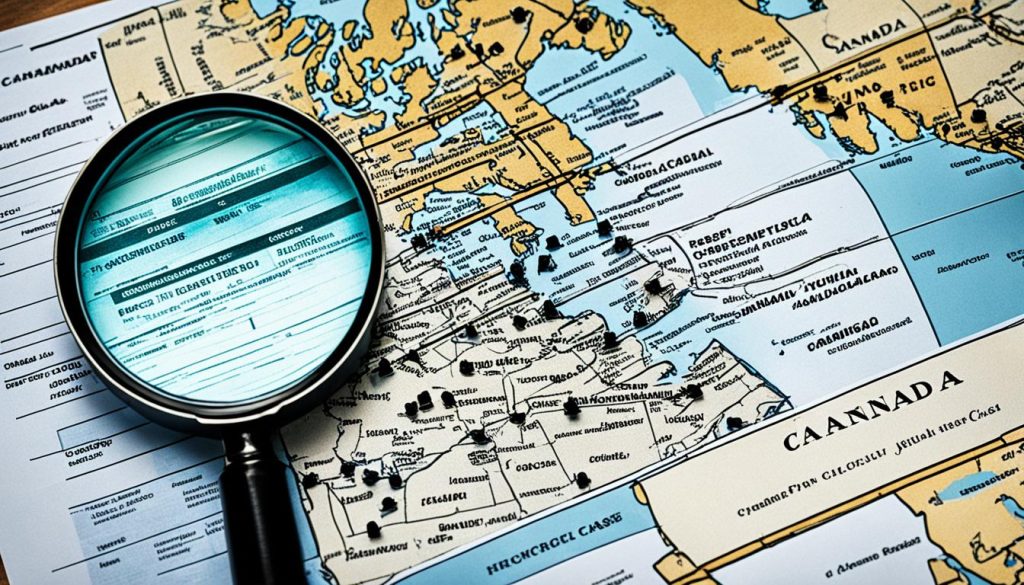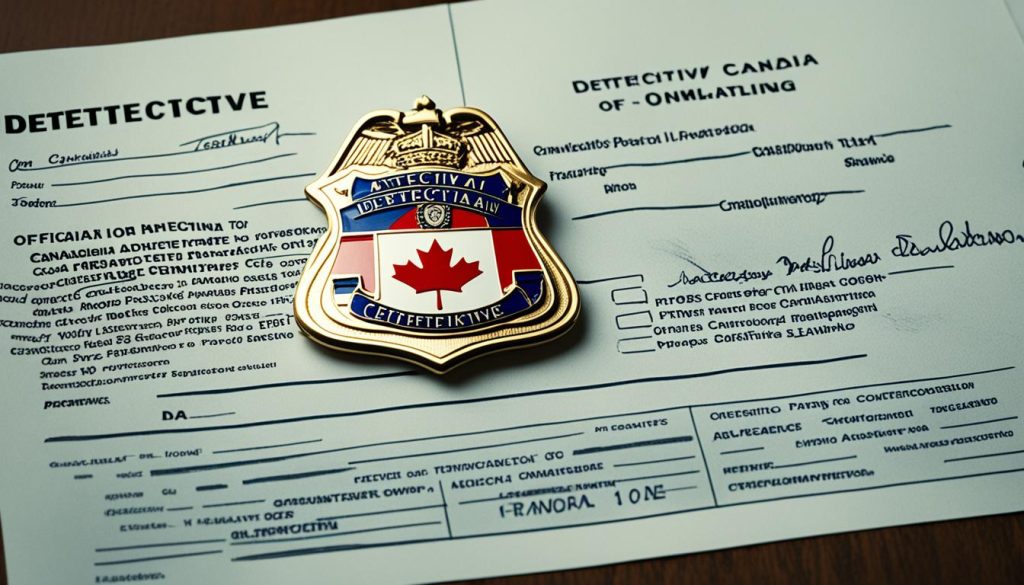Are you fascinated by the world of criminal investigations? Do you find yourself captivated by detective novels and TV shows, imagining yourself solving complex cases and bringing criminals to justice? If so, a career as a detective in Canada may be the perfect fit for you. Becoming a detective is an exciting and challenging path that requires a unique set of skills, knowledge, and experience. In this career guide, we will explore the steps you need to take to pursue your dream of becoming a detective in Canada. From the necessary education and training to the skills and qualities required for success, we will provide you with a comprehensive overview of the detective career path in Canada. So, if you’re ready to embark on a thrilling journey into the world of crime-solving, keep reading to discover how to become a detective in Canada.
Overview of Becoming a Detective in Canada
The role of a detective or criminal investigator in Canada is to meticulously investigate violations of the law using all available resources, such as witness testimonies, written records, video surveillance, and numerical data. Throughout the investigation process, detectives interpret information, prepare comprehensive reports, and provide a final evaluation of the evidence. They may also be required to testify in court proceedings.
Detectives often assess evidence in an office setting, but their work also involves extensive on-site visits to interview witnesses and examine crime scenes. Proficiency in research and analytical skills is essential, as detectives must synthesize information and draw well-reasoned conclusions.
1. Roles and Responsibilities of a Detective
The specific roles and responsibilities of criminal investigators in Canada can vary depending on the jurisdiction, as they are governed by federal, provincial, and local laws. Some detectives may work primarily in the field, actively gathering information, while others may focus on indoor tasks, such as tracking data and conducting research from their computers.
2. Different Types of Detectives in Canada
Canadian police detectives often specialize in different areas of crime, such as homicide and robbery investigation, cybercrime, narcotics, fraud, and commercial crimes. By concentrating on a specific field, detectives can develop expertise and refine their investigative skills, becoming valuable assets in solving complex cases and combating particular types of criminal activities.
Educational Requirements
The path to becoming a detective in Canada often begins with obtaining the right educational qualifications. According to the first source, the ideal majors for aspiring detectives include criminology, criminal justice, or psychology . Alternatively, individuals may choose to major in criminology while minoring in psychology, or vice versa.
Bachelor’s Degree in Criminal Justice or Related Field
The second source states that the first step in becoming a criminal investigator is completing a high school diploma or GED, and then earning an associate’s or bachelor’s degree in criminal investigation, criminal justice, criminology, or other related fields, such as law, sociology, accounting, engineering, foreign language, computer science, psychology, or forensics. During their studies, individuals may take courses in criminal law, victimology, community-oriented policing, criminology, theories of crime, substance abuse, and investigative techniques.
Police Academy Training
The third source explains that to become a police detective, individuals generally need to have at least a high school diploma or GED, but many aspiring detectives choose to pursue higher education in criminal justice or a related field, such as bachelor’s or associate’s degrees. Some police departments may also require specialized training in specific areas relevant to detective work, such as crime scene investigation, crime analysis, or law enforcement intelligence.
How to Become a Detective Canada?
Aspiring to become a detective in Canada requires a multi-step process that involves obtaining the necessary education, training, and hands-on law enforcement experience. The journey begins with earning a bachelor’s degree in a field related to criminal investigation, such as criminology, criminal justice, or psychology.
Step-by-Step Guide to Becoming a Detective
- Earn a bachelor’s degree in a field related to criminal investigation, such as criminology, criminal justice, or psychology.
- Apply to a large police force after college graduation and undergo a background check.
- Attend your province’s police academy for your police department, where you will learn how to operate a gun, how to arrest criminal offenders, and about provincial and national laws.
- Work as a fourth-class constable, handling general police work like issuing parking tickets and handling robberies.
- Express to your superiors your interest in detective or undercover work, and potentially work under a detective sergeant or detective constable to learn detective work firsthand.
- Earn a promotion to a higher-ranking police position, such as detective constable or detective sergeant, by impressing your superiors with your job performance and enthusiasm for detective work.
Entry-Level Law Enforcement Experience
The second source adds that in addition to a degree, some agencies may permit candidates to substitute the educational requirement with an apprenticeship as a criminal investigator, which may last for two to three years. The third source notes that most police detectives start their careers as police officers, gaining hands-on experience in various aspects of law enforcement before applying for promotions to the rank of detective.
Essential Skills for Detectives
To excel as a detective in Canada, individuals must possess a unique combination of critical thinking, attention to detail, and exceptional communication abilities. These skills are essential for effectively investigating cases, gathering and analyzing evidence, and collaborating with various stakeholders.
1. Critical Thinking and Problem-Solving Skills
Detectives must be adept at critical thinking and problem-solving, as they often work in challenging, fast-paced environments that require sound judgment and the ability to connect the dots. By analyzing all available evidence and witness statements, detectives can develop innovative solutions to complex cases, drawing upon their analytical skills and creative problem-solving techniques.
2. Attention to Detail and Observational Abilities
Successful detectives demonstrate a keen attention to detail and highly developed observational skills. They meticulously examine crime scenes, scrutinize evidence, and pay close attention to even the slightest of clues that could prove crucial to an investigation. This attention to detail, coupled with the ability to observe and interpret subtle behavioral cues, allows detectives to piece together the puzzle and uncover the truth.
3. Communication and Interpersonal Skills
Effective communication and interpersonal skills are cornerstones of a detective’s toolkit. Detectives must be able to clearly and concisely convey their findings, both orally and in written reports, to their colleagues, superiors, and even in court proceedings. Additionally, they must possess the ability to build rapport with witnesses, suspects, and other stakeholders, gaining their trust and eliciting valuable information that can aid the investigation.
By honing these essential skills, detectives in Canada can navigate the complexities of criminal investigations, analyze evidence with precision, and collaborate effectively with their teams to bring justice to their communities.

Career Paths and Specializations
As criminal investigators in Canada, professionals can choose to specialize in various fields, allowing them to develop in-depth expertise and hone their investigative skills. According to the second source, some common areas of specialization include homicide investigation, cybercrime investigation, and fraud and financial crimes investigation.
1. Homicide Investigation
Homicide investigation is a highly complex and demanding field that requires meticulous attention to detail and a comprehensive understanding of forensic science. Detectives specializing in this area work to uncover the circumstances surrounding suspicious deaths, analyze physical evidence, and build a strong case for prosecution. Their expertise in interrogation techniques, crime scene processing, and evidence collection is crucial in solving homicide investigation canada cases.
2. Cybercrime Investigation
The rapid evolution of technology has led to a surge in cybercrime investigation canada as a specialized field within law enforcement. Cybercrime investigators are responsible for investigating a wide range of digital crimes, including online fraud, data breaches, and internet-based exploitation. These detectives must stay up-to-date with the latest trends and techniques in digital forensics, digital evidence analysis, and cyber-related investigative methods.
3. Fraud and Financial Crimes Investigation
Detectives focused on fraud investigation canada and financial crimes investigation canada play a crucial role in uncovering complex financial schemes, tracing illicit funds, and building cases against white-collar criminals. Their expertise in accounting, financial analysis, and legal regulations is essential in unraveling intricate investigation techniques canada related to fraud, money laundering, and other financial crimes.
Specialization in these or other areas allows detectives to become highly valuable assets within law enforcement, solving complex cases and contributing significantly to the fight against specific types of criminal activities. Detectives who demonstrate exceptional performance, leadership skills, and a deep understanding of their specialized field may be considered for advancement to supervisory positions or leadership roles within their respective agencies.
Certification and Licensing Requirements
According to the second source, for most provinces in Canada, practicing as a criminal investigator, whether in the private or public sector, requires an investigator license. The provincial licensing board processes these licenses and maintains a comprehensive database of all criminal investigators. In the event of a criminal offense committed by the investigator, the licensing board may also choose to withdraw or suspend their license.
The third source, however, does not provide any additional information regarding the certification and licensing requirements for police detectives in Canada. It appears that the specific requirements may vary depending on the provincial or regional regulations governing law enforcement and private investigation services.
| Certification Requirement | Private Investigator Qualifications Canada | Detective Certification Canada |
|---|---|---|
| License | Required for all private investigators | Requirements may vary by province |
| Education | No specific educational requirements, but training in investigation techniques is recommended | Typically require a bachelor’s degree in a related field, such as criminal justice or criminology, in addition to police academy training |
| Experience | Previous experience in law enforcement, security, or investigation is preferred | Extensive law enforcement experience, often starting as a patrol officer and working their way up to detective |
| Ongoing Training | Private investigators must maintain their license through continuing education and professional development | Detectives must stay up-to-date with the latest investigative techniques, technologies, and legal practices through ongoing training and education |
The table highlights the key differences in the certification and licensing requirements for private investigators and police detectives in Canada. While both roles require specialized skills and training, the pathways to attaining these credentials may vary significantly based on the specific jurisdiction and the nature of the investigative work.

Salary and Job Outlook
The compensation for detectives and criminal investigators in Canada can vary significantly based on factors like experience, specialization, and location. According to the first source, the average total compensation (including tips, bonus, and overtime pay) for an early career detective salary canada with 1-4 years of experience is C$51,204 based on 7 salaries. A mid-career detective or criminal investigator with 5-9 years of experience earns an average total compensation of C$48,454 based on 8 salaries. In their late career (20 years and higher), employees earn an average total compensation of C$91,475.
1. Average Salaries for Detectives in Canada
The third source states that according to the Bureau of Labor Statistics (BLS), the median annual wage for detectives and criminal investigators was CAD $83,170 as of May 2019. This suggests that experienced and well-qualified detective salary canada can command a relatively high level of compensation in the Canadian job market.
2. Job Growth and Employment Prospects
The job outlook for detectives in canada appears to be stable, with the third source indicating that the job outlook for police detectives is projected to grow at a rate of 5%, which is slightly faster than the average for all occupations. This suggests a continued demand for qualified law enforcement careers canada in the coming years, providing promising job outlook for detectives in canada for those interested in pursuing this career path.
Challenges and Rewards of Being a Detective
The life of a detective in Canada is not without its challenges. Police detectives often encounter high-stakes and time-sensitive scenarios where their ability to think critically and act calmly is crucial to the success of a case. Dealing with the stress and emotional challenges that come with the job, such as witnessing traumatic events or interacting with difficult suspects and victims, can take a toll on a detective’s well-being.
1. Dealing with Stress and Emotional Challenges
Detectives must be adept at managing the stress and emotional demands of their work. Witnessing the aftermath of violent crimes, conducting interviews with distraught individuals, and navigating the complexities of criminal investigations can be mentally and emotionally draining. Developing coping strategies, seeking support from colleagues, and maintaining a healthy work-life balance are essential for detectives to maintain their resilience and effectiveness in the field.
2. Job Satisfaction and Sense of Purpose
Despite the challenges, the work of a police detective can also be highly rewarding, providing a strong sense of purpose and job satisfaction. Solving complex cases, bringing perpetrators to justice, and making a tangible difference in their communities can be deeply fulfilling for dedicated detectives. The opportunity to utilize their analytical skills, attention to detail, and problem-solving abilities to uncover the truth and protect the public can be a significant source of personal and professional satisfaction for those drawn to this challenging but impactful career.
Advancement Opportunities
According to the third source, advancement in a detective career is often achieved through continuous training, gaining experience, and demonstrating proficiency in their specialized area. Detectives who show exceptional performance, leadership qualities, and a comprehensive understanding of their respective specialization may be considered for promotion to supervisory positions or leadership roles within a law enforcement agency. These positions come with increased responsibilities and the opportunity to make a broader impact on crime prevention and investigation.
1. Promotional Paths Within Law Enforcement
Detectives who excel in their roles and demonstrate a strong command of investigative techniques, as well as effective leadership and communication skills, can often look forward to promotional paths within law enforcement. This may include advancing to positions such as detective constable, detective sergeant, or even taking on supervisory or managerial roles that allow them to oversee larger teams and guide the direction of criminal investigations.
2. Continuing Education and Professional Development
The source also emphasizes the importance of continuing education and professional development for police detectives to stay current in the field and increase their advancement opportunities. This can include attending specialized training programs, conferences, workshops, and staying updated on the latest advancements in investigative techniques, technology, and legal practices. By staying informed and continuously improving their skills, detectives can position themselves for future career growth and take advantage of emerging opportunities within law enforcement.
Work-Life Balance for Detectives
The demanding nature of detective work in Canada can pose challenges in maintaining a healthy work-life balance.
Detectives often face irregular work hours and shift work, which can disrupt their personal and family life. The need to respond to emergencies, conduct undercover operations, and work late into the night can make it difficult for them to manage their professional and private commitments effectively.
1. Irregular Work Hours and Shift Work
As the third source notes, typical hours for detectives and criminal investigators may vary greatly depending on the case. They may need to go undercover to observe events and conversations without the knowledge of suspects or other witnesses, resulting in the need to work early, late, and unpredictable hours. This irregular schedule can take a toll on a detective’s physical and mental well-being, making it challenging to establish a consistent routine and spend quality time with their loved ones.
2. Strategies for Maintaining Work-Life Balance
To address the challenges of work-life balance for detectives in Canada, it is essential for them to implement effective strategies. This may include setting clear boundaries between their professional and personal lives, practicing self-care through regular exercise, adequate rest, and stress management techniques, and seeking support from colleagues, supervisors, and their personal support network. By prioritizing their well-being and maintaining a healthy balance, detectives can not only improve their job satisfaction but also enhance their overall effectiveness in their investigations and problem-solving.

Conclusion
Becoming a detective in Canada is a rewarding and challenging career path that requires a combination of education, training, and specialized skills. The journey typically begins with earning a bachelor’s degree in a field related to criminal justice or investigation, followed by graduating from a police academy and gaining experience as a patrol officer. Aspiring detectives must then demonstrate their dedication, problem-solving abilities, and investigative expertise to earn promotions within the law enforcement hierarchy.
To pursue a career as a detective in Canada, individuals must have a strong foundation in subjects like criminology, criminal justice, or psychology. They must also complete extensive training at a police academy, where they will learn critical skills such as operating firearms, making arrests, and understanding provincial and national laws. Once they have gained entry-level law enforcement experience, detectives can focus on developing specialized expertise in areas like homicide investigation, cybercrime, or fraud and financial crimes.
Throughout their careers, Canadian detectives must continually enhance their skills and knowledge through ongoing education and professional development. By staying up-to-date with the latest investigative techniques and legal practices, detectives can position themselves for advancement opportunities and make a lasting impact on their communities. While the job can be demanding, with irregular work hours and emotional challenges, the sense of purpose and satisfaction that comes with solving complex cases makes it a rewarding career choice for those passionate about law enforcement and criminal investigations.
FAQ
1. What are the roles and responsibilities of a detective in Canada?
The primary role of a detective or criminal investigator is to investigate violations of the law using all resources necessary, such as witnesses, written records, video surveillance, and numerical data. Throughout the investigation, detectives or criminal investigators interpret information, prepare reports, and provide a final evaluation of the evidence. They may also be called on to testify in court. Detectives or criminal investigators often assess the evidence in an office setting, but much of the data is collected through on-site visits to witnesses and the crime scene.
2. What are the different types of detectives in Canada?
Depending on where they choose to work, the roles of criminal investigators may vary according to federal, provincial, or local laws. While some may work in the field, going out to gather information, others may work indoors tracking information and working from their computers. Criminal investigators usually choose areas of specialization focusing on different types of crime, such as homicide, cybercrime, or fraud and financial crimes.
3. What are the educational requirements to become a detective in Canada?
The first step in becoming a criminal investigator is completing a high school diploma or GED, and then earning an associate’s or bachelor’s degree in criminal investigation, criminal justice, criminology, or other related fields, such as law, sociology, accounting, engineering, foreign language, computer science, psychology, or forensics. During their studies, individuals may take courses in criminal law, victimology, community-oriented policing, criminology, theories of crime, substance abuse, and investigative techniques.
4. What are the essential skills required to be a successful detective in Canada?
The essential skills for a successful career as a criminal investigator include physical fitness, leadership skills, empathy, sound judgment, analytical skills, and strong communication skills. Successful police detectives also possess critical thinking and problem-solving skills, attention to detail and observational abilities, and strong communication and interpersonal skills.
5. What are the different career paths and specializations available for detectives in Canada?
Criminal investigators can choose areas of specialization focusing on different types of crime, such as homicide investigation, cybercrime investigation, and fraud and financial crimes investigation. Some common specializations for police detectives include homicide and robbery investigation, cybercrime, narcotics, fraud, and commercial crimes.




